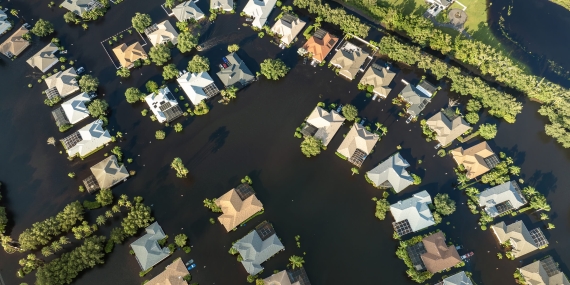TL;DR
We sit down with Russell Playford, Climate X's new Advisor, as he tells us about his background and his work with Climate X.
Who is Russell Playford?
- Russell, welcome! Before starting, could you introduce yourself briefly?
Hi, thank you for having me. In essence, my journey spans roughly four decades within the banking sector, split evenly between business units and risk management roles.
I began my career in Canada, my home country, and later ventured into international territories, including the United States, where I currently reside.
Following my retirement, I've remained active in the financial industry, offering guidance as a senior advisor and board member
- To start off, could you tell us about your initial impressions of Climate X and what drew you to join their Advisory Board?
Throughout my career, I've witnessed the transformation of credit risk management from a data-scarce environment to one built on robust data foundations.
This transition enabled groundbreaking insights into credit risk from a quantitative perspective, paving the way for the development of new products and even an entire industry.
Concepts such as models, CLOs (Collateralized Loan Obligations), dual grading, and RAROC (Risk-Adjusted Return On Capital) were considered revolutionary in their time.
My impression of Climate X is that it is harnessing some of these foundational concepts to comprehend and address climate risk in a manner that can allow for seamless integration into broader enterprise risk frameworks.

Working with Climate X
-
Drawing from your extensive experience as a Chief Risk Officer, what aspects of Climate X's approach to climate risk management do you find particularly promising or innovative?
From my perspective as a former Chief Risk Officer, I perceive Climate X's approach to climate risk management through a broad risk lens.
In today's banking landscape and across various industries, the focus extends beyond safeguarding financial strength alone; it encompasses aiding customers in managing their own risks effectively, be it through capital market products or compliance and fraud-related endeavors.
Climate X solutions integrate nicely here, enabling a bank to better manage climate-related risks for its credit customers but also its own risks.
The solutions do this in a way that is intuitive and useful to management whether they are dealing internally with their board and other stakeholders as well as externally with clients and regulators.
The data, analytics and reporting foundations enable many possible use cases to meet the challenges faced by Climate X clients.
-
Risk officers often grapple with the integration of climate risk into existing risk management frameworks. How can Climate X support these professionals in seamlessly incorporating climate considerations into their overall risk strategies?
The best solutions are easy to use and easy to understand. Dashboards are useful at a high level but limited in scope. Think of credit grades before PDs (probability of default). We all knew a grade 3 was better than a grade 4 but not by how much until PDs came on the scene.
Climate X solutions allow for that level of understanding and the possibility to integrate into existing quantitative risk measures in use for other risks.
Since the Global Financial Crisis, regulators have required banks to develop stress tests and scenario analytics capabilities.
Climate X facilitates completing these tasks efficiently and effectively again with output that provides analytical insights to risk levels and mitigant development.
-
How do you see the landscape of climate risk evolving for financial institutions, and how can Climate X's solutions address the unique challenges faced by risk officers and managers in the banking industry?
A persistent challenge faced by all CROs has been the availability of a solid data foundation. Older CROs will remember the need to go through paper files to build LGD (loss given default) scores and the lack of default data on their own banks’ portfolio.
The need for a solid, comprehensive data set is a first principle or should be. My sense is that this issue has not been solved yet, leaving banks and others in a world of manual processes that are time consuming, prone to error and cause friction with clients. Use of the data sets in whatever way need to be easy and minimize manual intervention.
Climate X solutions and databases have been developed to address these issues.
-
As reporting standards evolve, how do you believe Climate X can stay ahead in providing solutions that not only comply with current regulations, but also anticipate and adapt to upcoming changes in climate-related reporting obligations?
Reporting is an integral part of enterprise risk management frameworks.
As I mentioned earlier reports should be intuitive, easy to understand and actionable at the level being consumed. They should deal with level, amount of risk in dollars and %’s as well as migration trends. They should meet regulatory and other stakeholder needs.
Climate X solutions have been developed to meet current needs but also with the flexibility to adapt to future needs.
-
In your view, how can innovative solutions transform traditional approaches to risk management, providing a competitive advantage for banks and asset managers navigating the complexities of climate-related challenges?
Innovation has been a tradition in the banking industry.
Looking back over time there have been a continuous stream of innovations that have helped banks, and their customers manage risk. Absent a continuation of this tradition, other firms, fintech’s and others will insert themselves to fulfil customer needs. Dealing with climate risk management is another step in this direction.
Innovative solutions like those provided by Climate X will meet current needs and provide a foundation for evolution - some parts of which may feel revolutionary.
-
Finally, could you share your vision for Climate X's impact on the industry over the next five years?
Looking ahead, the span of five years presents ample opportunity, particularly in today's rapidly evolving landscape.
Climate X has the opportunity to materially influence the climate enterprise risk framework to be more data-driven, using quantitative analytics that can be easily integrated into bank processes.
My sense is there are opportunities to transform other risk areas including credit and operational risk.
About Russell Playford
Russ Playford is the former Chief Risk Officer of Bank of the West and RBS Americas who previously held senior executive roles at Wachovia Bank and was a Managing Director in the Corporate Banking Group at Bank of Montreal.
His experience includes both domestic and international leadership roles including as a member of the BNP Paribas Global Risk Executive Committee. Russ has also been a senior advisor to CEOs and other senior executives in financial services related firms.
Russell Playford joins Climate X as an Advisor to enhance the risk perspective of its solutions and deliver greater value to the company’s bank and other financial services clients.
Enquiries
For press/media enquiries, please get in touch with enquiries@climate-x.com.
Latest Articles & News
A selection of some of our latest articles covering industry, policy and climate science - written by us.
CBRE expands Climate Risk assessment capabilities with Climate X agreement
CBRE today announced expanded capabilities to provide climate risk data for property investors and occupiers to accelerate sustainability planning, reporting and decision-making.






